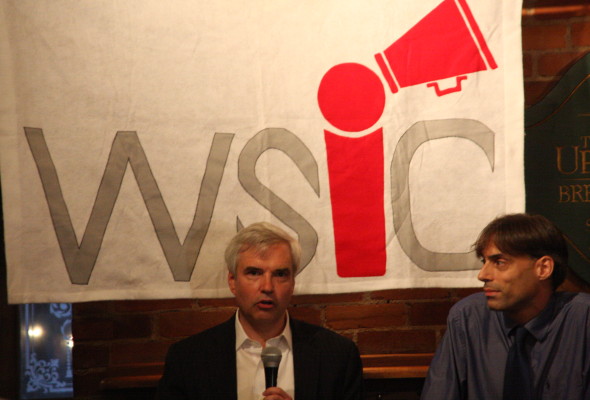On Monday August 17th, WSIC explored the topic of carbon pricing and the benefits and risks to Canadians associated with these measures. With Federal elections fast approaching, the environment is an increasingly important subject being tackled, and one with a broad impact. WSIC was pleased to host two qualified speakers to go through the issues: Brian Foody, CEO of Iogen – a leader in developing technology making clean burning, renewable biofuels from agricultural residues and organic waste – and Yannick Trottier, co-founder of Spectral Applied Research and member of The Climate Reality Project – a non-profit organization seeking to raise awareness among Canadians about the urgency of climate change.
When opting to determine a price on carbon, our speakers highlighted and thoroughly discussed the two main options available for government: the “cap and trade” vs. the “fee and dividend” system. In a cap and trade system (as already adopted in California and Quebec), the government caps carbon emissions from large polluters by setting legal limits, which are lowered over time to reduce the amount of pollutants released into the atmosphere. If a company is able to reduce its pollution easily and cheaply, it can end up with extra allowances which it can then sell to other companies – generating revenue in the process. Benefits of implementing this type of structure allow companies to plan well in advance as the cap on emissions is gradually and predictably lowered each year. Additionally, while companies may exchange allowances between each other, the total number of allowances remains the same, thereby achieving hard limits on pollution emitted each year.
In a fee and dividend system, an incremental fee is imposed by government on companies emitting pollutants, with the fee increasing steadily each year until such point where clean energy becomes cheaper to employ over fossil fuels. All the money collected through the fee system would be returned Canadians on an equitable basis, regardless of a household’s carbon footprint, and assisting with increased costs being passed along by corporates paying the fees. Households which have a large carbon footprint will feel the effects of the fee system which will exceed the dividend return, thus incentivizing change. Conversely, a family reducing its carbon footprint to less than average will make money from the program. The program also benefits from being predictable through employing increasingly higher carbon prices – encouraging entrepreneurs and investors to focus on clean-energy options.
Both Brian and Yannick weighed in on the pros and cons of implementing each type of system. Under a cap and trade system, it was argued that the net amount of emissions released will not generate any material and meaningful environmental impact unless substantial reductions are implemented – something which we have yet to see in other jurisdictions with this system already in place and something which our own government is unlikely to execute on. A fee and dividend system on the other hand has a strong class component feature to it as it gives money to everyone equally, including the wealthy few to whom it would make no difference. Perhaps a better option would be to allocate such fees into targeted social programs instead.
When asked why the focus on carbon as opposed to other pollutants, Yannick pointed out the devastation that carbon alone could wreak on the planet. Other pollutants might kill a handful of people at a time whereas increasing carbon emissions threaten the entire Earth. Surprising the audience, Yannick said he would sooner take several nuclear meltdowns over the continued rise in carbon dioxide output.
While there is no one clear solution going forward, it remains apparent that WSIC audience members feel strongly about the topic. Whereas governments have traditionally side-lined environmental issues and chosen to focus exclusively on the economy, more and more Canadians are aware and advocating environmental policies which benefit the economy and citizens as a whole, in addition to bolstering Canada’s international environmental reputation. Brian made it painfully clear that industry responds to price signals. Give industry incentive to reduce carbon and they will. They will do it cheaper than we imagined and it will not cause a doomsday economic scenario.
We at WSIC keenly look forward to further debates and conversations on the topic in the coming months and thank our speakers for providing insightful and educational commentary to our audience members on such an important topic. Until next time.







